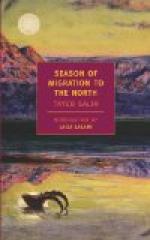[Illustration: The Canadian Women’s Press Club]
To those who bid us good-bye at the train, the Kid and I yell exultantly, “All aboard for the Arctic Ocean and way ports!”
A group of Galicians sitting by the curb, two mothers and seven small children, one a baby at the breast, make the last picture we see as the train pulls out. It was the end of their first day in Winnipeg. The fathers of the flock evidently were seeking work and had left their families gazing through the portals of the strange new land. In the half-sad, altogether-brave lines on the young mothers’ faces and their tender looks bent on the little ones we read the motive responsible for all migrations—“Better conditions for the babies.” In the little fellows of seven or eight with their ill-fitting clothes and their dogged looks of determination one sees the makers of empire. Before a decade is past they will be active wheat-growers in their own right, making two grains grow where one grew before and so “deserving better of mankind than the whole race of politicians put together.” I think it was President Garfield who said, “I always feel more respect for a boy than for a man. Who knows what possibilities may be buttoned up under that ragged jacket?” It doesn’t take long for the foreigners to make good. A young Icelander, Skuli Johnson, of all the thousands of Winnipeg students, this year captured the coveted honor of the academic world—the Rhodes scholarship.
We slip out of Winnipeg as the bells of St. Boniface ring the vespers from their turrets twain. Whittier, who never saw this quaint cathedral, has immortalized it in verse. The story is one of those bits of forgotten history so hard to get hold of in a day when Winnipeg measures its every thought in bushels and bullion.
The settlers who came to Selkirk on the outskirts of present Winnipeg just a hundred years ago were sturdy Scots, weaned on the Psalms of David and the Shorter Catechism. There were English missionaries here and priests of the Church of Rome, but the disciples of John Knox wanted some one to expound Predestination to them. A religious ceremony performed by any man who was not a Presbyterian seemed scarcely binding. One old lady, speaking of the nuptials of her daughter, said, “I wudna have Janet marrit by the bishop. She maun wait till we can have a properly-ordained meenister.” And he was coming. Even now he was floating in on the Red River with Indian and half-breed boatmen, having reached St. Paul from Scotland via the Atlantic seaboard some weeks before.
When a Scot and an Indian get in a boat together, to use a Will Carleton phrase, “they do not teem with conversational grace.” Straight from Aberdeen, the young Dominee coming into Winnipeg little dreamed that the Church of Rome had established its Mission on the Red River decades ago. In fact, he knew as little about Canada as he did about Timbuctoo, and in his simplicity thought himself “the first that ever burst into that silent sea.” When the evening breeze brought to his ears a muffled sound, he was in doubt how to place it.




